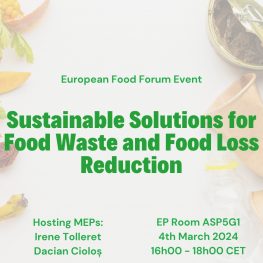Start
March 4, 2024 - 16:00
End
March 4, 2024 - 18:00
Sustainable Solutions for Food Waste and Food Loss Reduction
4th March 2024
16.00-18.00 CET
In 2020, the EU experienced 130 kg of food waste per capita, presenting a multifaceted challenge. Food waste involves vital resources like water, energy, agricultural products and ingredients. To illustrate, the water consumed in producing discarded food equals to a staggering 342 billion m3. This wasteful practice extends to food being discarded and left unused for human consumption, despite a growing number of individuals grappling with malnutrition or economic hardships. Notably, 32.6 million people in the EU struggle to afford a meal with meat, fish, chicken, or a vegetarian equivalent every other day. The 58.5 million tons of food wasted in the EU during 2020 contributed to emissions totaling 252 mllion tons of CO2 equivalents, constituting 16% of the overall greenhouse gas impact from the EU food system. As regards economic consequences, the 58.5 Mt of food waste have an associated market value estimated at 132 bn EUR25. These costs include lost resources by food business operators at each stage of the food supply chain, but also unnecessary spending by households. In addition, the cost of collection and treatment of food waste is estimated at an additional 9.3 bn EUR2.
The global impact of food loss and waste is substantial, contributing to approximately 8% of global greenhouse gas emissions while needlessly utilizing land and water resources and heightening pressure on biodiversity. Aligned with the United Nations’ Sustainable Development Goal 12.3, there is a call to halve food waste at the retail and household levels, concurrently reducing food loss throughout the supply chain. Given the gravity of the issue, the European Commission published a proposal in July 2023 establishing the requirement for Member States to take the necessary measures to reduce food waste by the end of 2030:
- by 10%, in processing and manufacturing,
- by 30% (per capita), jointly at retail and consumption (restaurants, food services and households).
Key Questions:
- How can the proposed reduction targets be met?
- How can industry, consumers and governments share best practices in minimizing food waste generation?
- Is facilitating food donation a viable solution?
- How can consumers be better informed about food and drink expiration dates? What role can early education play?
- How can legislation on food waste complement other regulations, such as packaging? How to best ensure the complementarity and consistency of EU rules and address tradeoffs?
- How can reducing food loss and waste advance the transition to more sustainable food systems?
Hosting MEPs:
Mr Dacian Cioloș
Ms. Irène Tolleret – EFF Chair
Download here the event program




